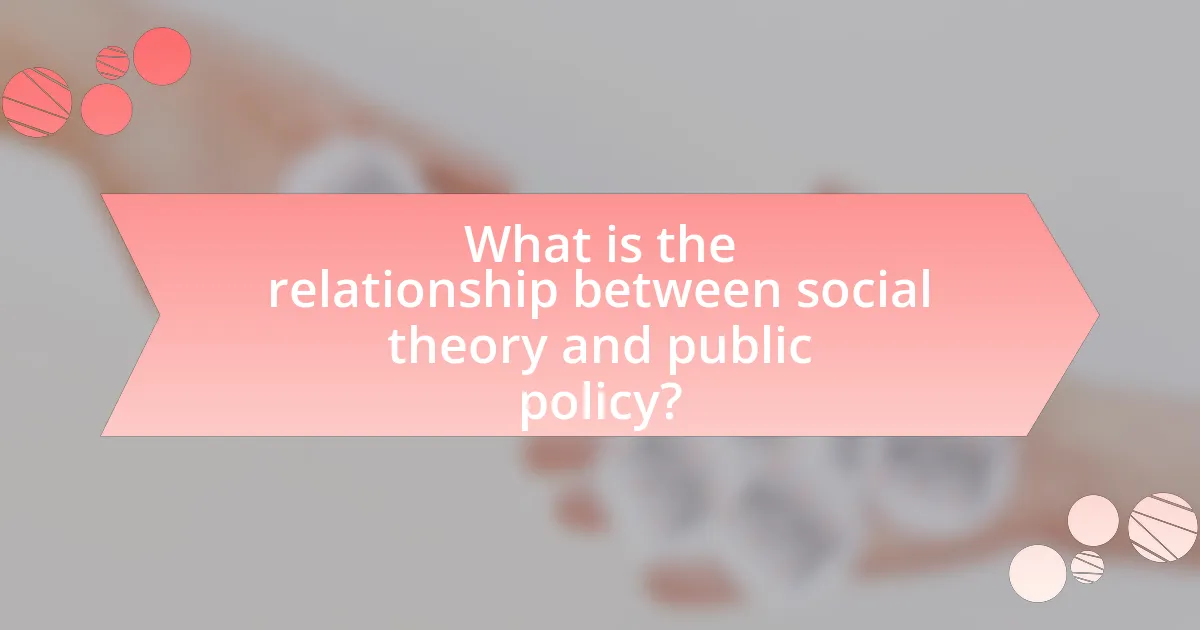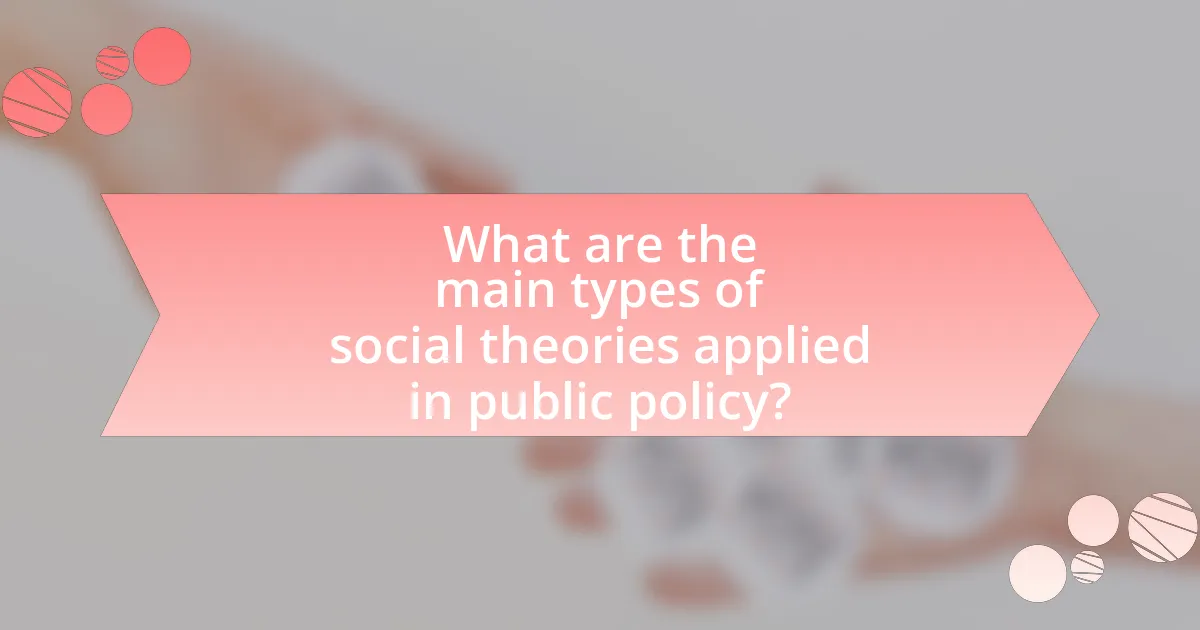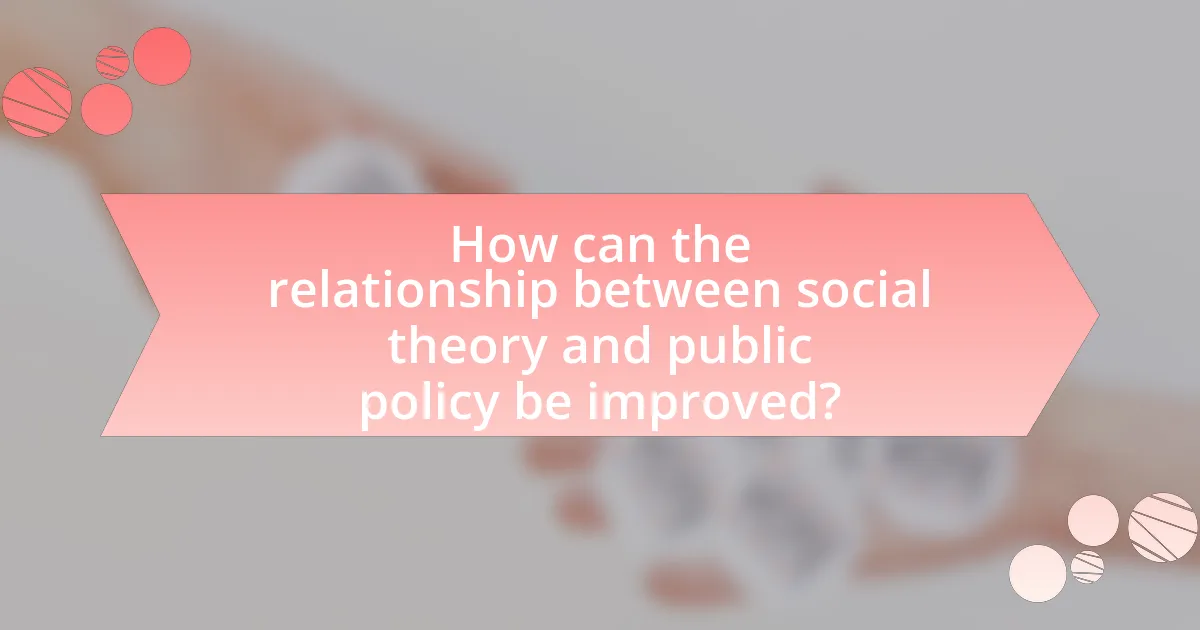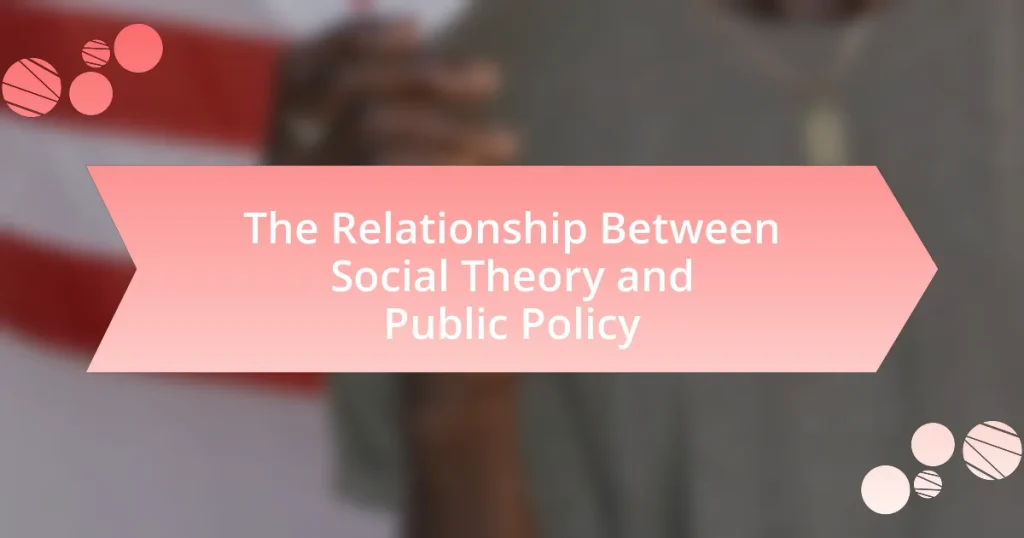The article examines the relationship between social theory and public policy, highlighting how social theories provide frameworks that inform and shape policy decisions. It discusses key theories such as structural functionalism, conflict theory, rational choice theory, and social constructivism, illustrating their influence on policy formulation and implementation. The article emphasizes the importance of integrating social theories into policy-making processes to enhance effectiveness and address societal issues, while also addressing the challenges and limitations policymakers face in applying these theories. Additionally, it outlines strategies for improving collaboration between theorists and practitioners to ensure policies are grounded in empirical evidence and relevant social dynamics.

What is the relationship between social theory and public policy?
Social theory informs public policy by providing frameworks that help understand social phenomena and guide decision-making processes. Theories such as structural functionalism and conflict theory offer insights into societal structures and power dynamics, which policymakers can use to address issues like inequality and social justice. For instance, the application of social theories in the development of welfare policies demonstrates how theoretical perspectives can shape practical solutions to societal problems. This relationship is evident in historical contexts, such as the New Deal in the United States, where social theories influenced policies aimed at economic recovery during the Great Depression.
How do social theories influence public policy decisions?
Social theories influence public policy decisions by providing frameworks that shape understanding of social issues and guide the formulation of policies. For instance, theories such as social constructivism highlight how societal norms and values impact policy priorities, leading to decisions that reflect collective beliefs. Empirical evidence shows that policies addressing issues like poverty and education often stem from theoretical perspectives that emphasize social equity and justice, as seen in the implementation of welfare programs influenced by theories of social justice. Thus, the integration of social theories into policy-making processes ensures that decisions are informed by a deeper comprehension of societal dynamics and challenges.
What are the key social theories relevant to public policy?
Key social theories relevant to public policy include rational choice theory, social constructivism, and institutionalism. Rational choice theory posits that individuals make decisions based on a cost-benefit analysis, influencing policy design and implementation by emphasizing efficiency and utility maximization. Social constructivism highlights the role of social norms, values, and identities in shaping public policy, suggesting that policies are constructed through social interactions and discourse. Institutionalism focuses on the impact of institutions—formal and informal rules and norms—on policy outcomes, emphasizing how established structures influence decision-making processes. These theories provide frameworks for understanding the complexities of policy development and the interplay between societal factors and governmental actions.
How do these theories shape policy frameworks?
Theories shape policy frameworks by providing foundational principles that guide decision-making and implementation processes. For instance, social theories such as rational choice theory influence policymakers to prioritize efficiency and cost-effectiveness in resource allocation, while theories like social constructivism emphasize the importance of societal values and norms in shaping public policies. Empirical evidence supports this relationship; for example, the application of behavioral economics in policy design has led to successful interventions, such as nudging strategies that improve public health outcomes. Thus, the integration of these theories into policy frameworks ensures that policies are not only effective but also aligned with societal expectations and behaviors.
Why is understanding this relationship important?
Understanding the relationship between social theory and public policy is important because it informs effective policy-making by grounding decisions in empirical evidence and theoretical frameworks. Social theories provide insights into societal behaviors, structures, and dynamics, which can guide policymakers in addressing social issues. For instance, the application of social theories such as structural functionalism or conflict theory can help identify the root causes of social problems, leading to more targeted and effective interventions. Research indicates that policies informed by social theory are more likely to achieve desired outcomes, as they consider the complexities of human behavior and social systems.
What implications does this relationship have for policymakers?
The relationship between social theory and public policy has significant implications for policymakers, as it informs the development and implementation of effective policies. Policymakers must understand social theories to address societal issues accurately, as these theories provide frameworks for analyzing social behavior and institutional dynamics. For instance, the application of social constructivism can help policymakers recognize how societal perceptions shape public opinion and policy acceptance, leading to more tailored and effective interventions. Additionally, empirical evidence from studies, such as those conducted by the National Academy of Sciences, demonstrates that policies grounded in robust social theories tend to yield better outcomes, as they are more aligned with the realities of human behavior and social structures. Thus, integrating social theory into policy formulation enhances the likelihood of achieving desired social outcomes.
How can social theory enhance public policy effectiveness?
Social theory can enhance public policy effectiveness by providing frameworks that help policymakers understand social dynamics and behaviors. These frameworks enable the identification of underlying social issues, guiding the development of targeted interventions. For instance, theories such as social capital theory illustrate how community networks can influence policy outcomes, as evidenced by research showing that communities with strong social ties often achieve better health and educational results. By applying social theories, policymakers can create more informed, equitable, and sustainable policies that address the specific needs of diverse populations.

What are the main types of social theories applied in public policy?
The main types of social theories applied in public policy include rational choice theory, institutionalism, constructivism, and critical theory. Rational choice theory posits that individuals make decisions based on maximizing utility, influencing policy design by emphasizing cost-benefit analyses. Institutionalism focuses on the role of institutions and their structures in shaping policy outcomes, highlighting how rules and norms affect decision-making processes. Constructivism examines how social constructs and collective beliefs influence policy agendas and implementation, stressing the importance of context and discourse. Critical theory challenges existing power structures and advocates for social change, often addressing issues of inequality and justice in policy formulation. These theories provide frameworks for understanding the complexities of public policy and guide policymakers in addressing societal issues effectively.
How do different social theories approach policy analysis?
Different social theories approach policy analysis by providing distinct frameworks for understanding social phenomena and guiding decision-making processes. For instance, structural functionalism emphasizes the role of social institutions in maintaining stability and order, suggesting that policies should enhance social cohesion. In contrast, conflict theory focuses on power dynamics and inequality, advocating for policies that address systemic injustices and empower marginalized groups. Additionally, symbolic interactionism highlights the importance of individual perceptions and interactions, indicating that effective policies must consider the subjective experiences of those affected. These theoretical perspectives shape the analysis of policies by framing the issues at stake, identifying stakeholders, and proposing solutions that align with their underlying assumptions about society.
What role does structural functionalism play in public policy?
Structural functionalism plays a crucial role in public policy by providing a framework for understanding how various social institutions contribute to the stability and functioning of society. This theory posits that each component of society, including government, education, and family, serves a specific function that helps maintain social order. For instance, public policies that promote education can be seen as essential for preparing individuals to fulfill their roles in the workforce, thereby supporting economic stability and social cohesion. Empirical studies, such as those by Talcott Parsons, illustrate how structural functionalism emphasizes the interdependence of societal elements, reinforcing the idea that effective public policy must consider the broader social context to achieve desired outcomes.
How does conflict theory critique existing policies?
Conflict theory critiques existing policies by highlighting how they often serve the interests of powerful groups at the expense of marginalized populations. This perspective argues that policies are shaped by the dynamics of power and inequality, leading to systemic injustices. For example, policies related to taxation and welfare can disproportionately benefit the wealthy while neglecting the needs of lower-income individuals, reinforcing social stratification. Research by Karl Marx emphasizes that the ruling class uses policy to maintain control, illustrating how legislation can perpetuate economic disparities. Thus, conflict theory provides a lens through which to analyze and challenge the inequities embedded in public policy.
What are the limitations of applying social theory to public policy?
The limitations of applying social theory to public policy include the oversimplification of complex social phenomena and the potential disconnect between theoretical frameworks and practical realities. Social theories often generalize human behavior, which can lead to policies that do not account for local contexts or individual differences. For instance, theories based on rational choice may overlook emotional and cultural factors that influence decision-making. Additionally, social theories may lack empirical validation, making it difficult to apply them effectively in diverse settings. This disconnect can result in policies that fail to achieve intended outcomes, as evidenced by the limited success of programs based on theoretical models that do not resonate with the target population’s lived experiences.
What challenges do policymakers face when integrating theory into practice?
Policymakers face several challenges when integrating theory into practice, primarily including the complexity of translating abstract concepts into actionable policies. Theoretical frameworks often lack direct applicability to real-world situations, leading to difficulties in implementation. Additionally, policymakers must navigate conflicting interests among stakeholders, which can hinder consensus on theoretical applications. Evidence from the 2018 report by the National Academy of Sciences highlights that policymakers frequently struggle with limited resources and time constraints, which impede thorough analysis and adaptation of theoretical insights. Furthermore, the dynamic nature of social issues means that theories may quickly become outdated, complicating their relevance in practical scenarios.
How can these limitations be addressed?
Limitations in the relationship between social theory and public policy can be addressed by integrating interdisciplinary approaches that combine empirical research with theoretical frameworks. This integration allows policymakers to ground their decisions in robust evidence while considering the complexities of social dynamics. For instance, utilizing mixed-methods research, which combines qualitative and quantitative data, can provide a more comprehensive understanding of social issues, leading to more effective policy solutions. Studies have shown that policies informed by interdisciplinary research tend to yield better outcomes, as they account for various social factors and stakeholder perspectives.

How can the relationship between social theory and public policy be improved?
The relationship between social theory and public policy can be improved by fostering interdisciplinary collaboration between social scientists and policymakers. This collaboration can enhance the relevance of social theories in addressing real-world issues, ensuring that policies are informed by empirical evidence and theoretical insights. For instance, integrating findings from social psychology into public health policies has been shown to increase the effectiveness of interventions, as evidenced by the success of behavior change campaigns that utilize social norms theory. By creating platforms for ongoing dialogue and joint research initiatives, both fields can benefit from shared knowledge and practical applications, ultimately leading to more effective and responsive public policies.
What strategies can enhance the integration of social theory in policy-making?
Strategies that can enhance the integration of social theory in policy-making include fostering interdisciplinary collaboration, utilizing participatory approaches, and implementing evidence-based practices. Interdisciplinary collaboration allows policymakers to draw insights from various social theories, enriching the policy-making process with diverse perspectives. Participatory approaches engage stakeholders, ensuring that social theories reflect real-world experiences and needs, which can lead to more effective policies. Evidence-based practices, supported by empirical research, validate the relevance of social theories in addressing societal issues, thereby strengthening their application in policy-making. For instance, the integration of social theories in public health policy has been shown to improve health outcomes by addressing social determinants of health, as evidenced by studies from the World Health Organization.
How can collaboration between theorists and practitioners be fostered?
Collaboration between theorists and practitioners can be fostered through structured partnerships that facilitate knowledge exchange and mutual understanding. Establishing interdisciplinary workshops and forums allows both groups to share insights, challenges, and practical applications of theories in real-world contexts. Research indicates that such collaborative environments enhance the relevance of theoretical frameworks by grounding them in practical experiences, thereby improving policy outcomes. For instance, the National Academy of Sciences emphasizes the importance of integrating scientific research with policy-making to address complex societal issues effectively.
What role does empirical research play in bridging theory and policy?
Empirical research serves as a critical link between theory and policy by providing evidence-based insights that inform decision-making processes. This research translates theoretical concepts into practical applications, allowing policymakers to understand the real-world implications of social theories. For instance, studies such as “The Role of Evidence in Policy Making” by the National Academy of Sciences highlight how empirical data can validate or challenge existing theories, ensuring that policies are grounded in reality rather than assumptions. By utilizing empirical findings, policymakers can craft more effective interventions that address societal issues, thereby enhancing the relevance and applicability of social theories in public policy.
What best practices should policymakers follow to leverage social theory?
Policymakers should integrate social theory into their decision-making processes to enhance the effectiveness of public policies. This involves understanding the underlying social dynamics and behaviors that influence policy outcomes. For instance, utilizing theories such as social constructivism can help policymakers recognize how societal norms shape public perception and acceptance of policies. Empirical evidence supports that policies informed by social theories, such as the Theory of Planned Behavior, lead to higher compliance rates, as they align with individuals’ attitudes and perceived control over their actions. By applying these theories, policymakers can design interventions that resonate with the target population, ultimately improving policy effectiveness and societal impact.
How can policymakers stay informed about relevant social theories?
Policymakers can stay informed about relevant social theories by engaging with academic research, attending conferences, and collaborating with social scientists. Engaging with academic research allows policymakers to access peer-reviewed studies that provide insights into social theories and their implications for public policy. Attending conferences facilitates networking with experts in the field, enabling the exchange of ideas and the latest developments in social theory. Collaborating with social scientists ensures that policymakers can apply theoretical frameworks to real-world issues, enhancing the effectiveness of their policies.
What tools can assist in applying social theory to public policy effectively?
Analytical frameworks, data analysis software, and participatory research methods are tools that can assist in applying social theory to public policy effectively. Analytical frameworks, such as the Social-Ecological Model, help policymakers understand the complex interactions between individuals and their environments, guiding the development of comprehensive policies. Data analysis software, like SPSS or R, enables the examination of social trends and outcomes, providing empirical evidence to support theoretical applications. Participatory research methods, including focus groups and community surveys, engage stakeholders in the policy-making process, ensuring that social theories are grounded in real-world experiences and needs. These tools collectively enhance the relevance and effectiveness of public policy informed by social theory.
